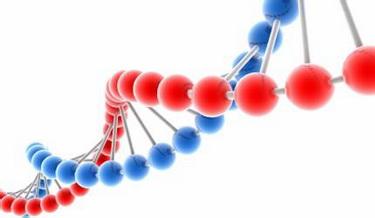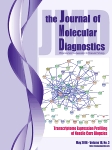
2016年6月12日讯 /生物谷BIOON/ –近日,在一项发表在国际学术期刊The Journal of Molecular Diagnostics上的最新研究中,科学家们开发了一种检测肺癌和结直肠癌中的KRAS基因突变的新技术。
发现并对肿瘤特异性基因变异进行功能分析为预测治疗应答,帮助病人选择有效的治疗策略提供了可能性。正常的KRAS基因产物主要参与细胞分裂的调控,而许多癌症中都存在KRAS基因突变,到目前为止许多研究证明KRAS基因突变是预测非小细胞肺癌和结直肠癌病人治疗敏感性的一个强力生物标记物。
研究人员表示,由于传统的基因突变检测方法需要复杂耗时的过程,同时还需要昂贵的仪器,因此并不适合进行KRAS突变的常规临床筛查。为了克服这些问题,研究人员开发了这种能够对肺癌和结直肠癌样本进行常规检测的新技术。
这项研究使用了杂交诱导聚合技术进行突变检测,能够在PCR扩增之后的不到十分钟内检测到常见KRAS突变。杂交诱导聚合技术是一种基于bead的DNA检测技术,适用于微芯片平台。
在这项研究中,研究人员对20个肺癌和结直肠癌样本进行了分析,并将结果与传统测序方法进行了对比,结果表明利用这项新技术筛查到的KRAS突变与测序结果100%吻合。除此之外,研究人员还报告称在其中一个样本中,即使在正常DNA背景下仅有25%的KRAS突变含量也能够被检测到。
这些结果表明这项基于杂交诱导聚合技术的突变检测方法具有非常高的准确性,适用于真正的临床检测,并且研究人员还表示这项技术不仅能够快速获得结果,同时具有很高的性价比,因此该研究为个体化肿瘤治疗策略的制定提供了一个有效的分析工具。(基因宝jiyinbao.com)

Hybridization-Induced Aggregation Technology for Practical Clinical Testing : KRAS Mutation Detection in Lung and Colorectal Tumors
Hillary S. Sloane, James P. Landers, Kimberly A. Kelly
KRAS mutations have emerged as powerful predictors of response to targeted therapies in the treatment of lung and colorectal cancers; thus, prospective KRAS genotyping is essential for appropriate treatment stratification. Conventional mutation testing technologies are not ideal for routine clinical screening, as they often involve complex, time-consuming processes and/or costly instrumentation. In response, we recently introduced a unique analytical strategy for revealing KRAS mutations, based on the allele-specific hybridization-induced aggregation (HIA) of oligonucleotide probe-conjugated microbeads. Using simple, inexpensive instrumentation, this approach allows for the detection of any common KRAS mutation in <10 minutes after PCR. Here, we evaluate the clinical utility of the HIA method for mutation detection (HIAMD). In the analysis of 20 lung and colon tumor pathology specimens, we observed a 100% correlation between the KRAS mutation statuses determined by HIAMD and sequencing. In addition, we were able to detect KRAS mutations in a background of 75% wild-type DNA-a finding consistent with that reported for sequencing. With this, we show that HIAMD allows for the rapid and cost-effective detection of KRAS mutations, without compromising analytical performance. These results indicate the validity of HIAMD as a mutation-testing technology suitable for practical clinical testing. Further expansion of this platform may involve the detection of mutations in other key oncogenic pathways.
 基因君官网
基因君官网